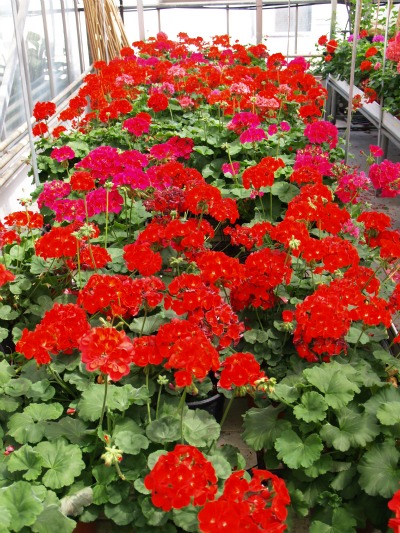
Features
Crop Culture
Inputs
Producing geraniums without pollen
September 18, 2012 By Institute for Plant Molecular and Cell Biology
Sept. 18, 2012, Valencia, Spain — Allergy problems? Spanish scientists have successfully grown geraniums that do not produce
pollen.
Sept. 18, 2012, Valencia, Spain — Many ornamental plants cause allergic reactions to consumers and flower growers.
Spanish scientists have found a solution to this common problem. They have successfully grown geraniums (Pelargonium spp.) that do not produce pollen.
Male sterility in ornamental plants could have many applications in addition to the removal of pollen, such as extending the flowering period, increasing vegetative growth and longevity of the flowers. The results are published in BMC Plant Biology.
“The use of this technology could be especially useful for producing environment friendly ornamental plants and it also allows us to prevent gene flow between genetically modified plants and related species,” says Professor José Pío Beltrán from the Institute for Plant Molecular and Cell Biology (Universitat Politècnica de València – Consejo Superior de Investigaciones Científicas).
The geranium, with over 200 species, is one of the most popular garden plants in the world, has a great importance in the ornamental plant market and is widely used by the perfume industry.
Conventional crossbreeding techniques have so far resulted in plants with excellent characteristics.
However, the technique of gene transfer by Agrobacterium tumefaciens bacterium could also be a useful tool to further enhance geraniums as it allows for the introduction of new genes or traits.
Researcher Luis Antonio Cañas says they have used this bacterium as a means to insert into the DNA of the geranium plant two foreign genes: pSAG12::ipt and PsEND1:barnasse.
Plants inoculated with the first showed a delay in the aging of leaves and more branching. The leaves and flowers were smaller but showed a more intense colour.
The plants inoculated with the second gene, on the other hand, lost its anthers, which is the terminal portion of the stamen in which pollen is produced.
Thanks to this knowledge, tests can begin with other ornamental plants.
 |
| Male sterility in ornamental plants could have many applications. |
Print this page